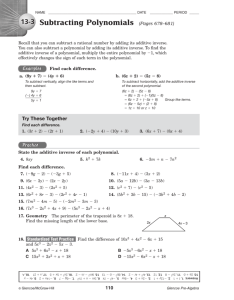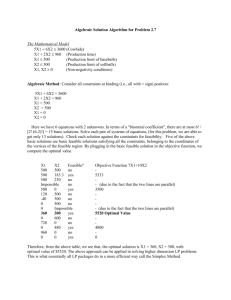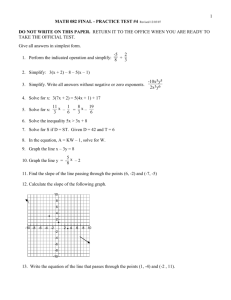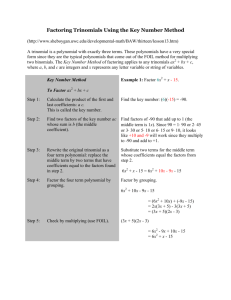Algebra 1
advertisement
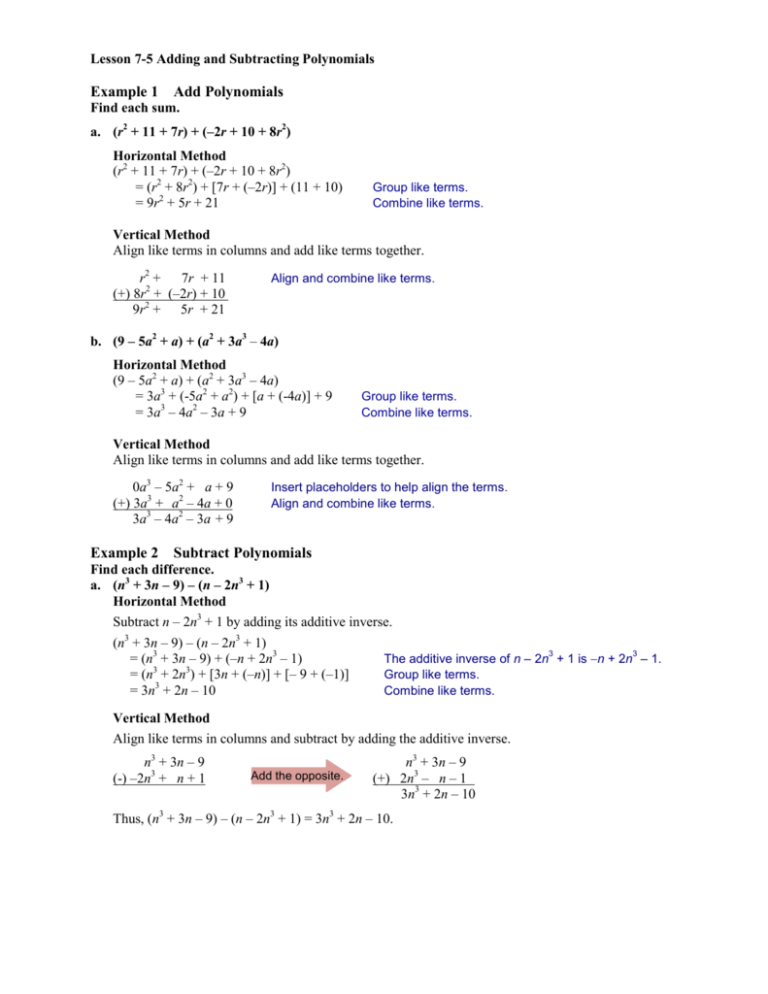
Lesson 7-5 Adding and Subtracting Polynomials Example 1 Add Polynomials Find each sum. a. (r2 + 11 + 7r) + (–2r + 10 + 8r2) Horizontal Method (r2 + 11 + 7r) + (–2r + 10 + 8r2) = (r2 + 8r2) + [7r + (–2r)] + (11 + 10) = 9r2 + 5r + 21 Group like terms. Combine like terms. Vertical Method Align like terms in columns and add like terms together. r2 + 7r + 11 (+) 8r2 + (–2r) + 10 9r2 + 5r + 21 Align and combine like terms. b. (9 – 5a2 + a) + (a2 + 3a3 – 4a) Horizontal Method (9 – 5a2 + a) + (a2 + 3a3 – 4a) = 3a3 + (-5a2 + a2) + [a + (-4a)] + 9 = 3a3 – 4a2 – 3a + 9 Group like terms. Combine like terms. Vertical Method Align like terms in columns and add like terms together. 0a3 – 5a2 + a + 9 (+) 3a3 + a2 – 4a + 0 3a3 – 4a2 – 3a + 9 Insert placeholders to help align the terms. Align and combine like terms. Example 2 Subtract Polynomials Find each difference. a. (n3 + 3n – 9) – (n – 2n3 + 1) Horizontal Method Subtract n – 2n3 + 1 by adding its additive inverse. (n3 + 3n – 9) – (n – 2n3 + 1) = (n3 + 3n – 9) + (–n + 2n3 – 1) = (n3 + 2n3) + [3n + (–n)] + [– 9 + (–1)] = 3n3 + 2n – 10 The additive inverse of n – 2n + 1 is n + 2n – 1. Group like terms. Combine like terms. 3 Vertical Method Align like terms in columns and subtract by adding the additive inverse. n3 + 3n – 9 (-) –2n3 + n + 1 Add the opposite. n3 + 3n – 9 (+) 2n3 – n – 1 3n3 + 2n – 10 Thus, (n3 + 3n – 9) – (n – 2n3 + 1) = 3n3 + 2n – 10. 3 b. (6x2 – 17x3 + 7) – (2x2 – x3 + x) Horizontal Method Subtract 2x2 – x3 + x by adding its additive inverse. (6x2 – 17x3 + 7) – (2x2 – x3 + x) = (6x2 – 17x3 + 7) + (-2x2 + x3 – x) = (-17x3 + x3) + [6x2 + (-2x2)] + (–x) + 7 = -16x3 + 4x2 – x + 7 2 3 2 3 The additive inverse of 2x – x + x is -2x + x – x. Group like terms. Combine like terms. Vertical Method Align like terms in columns and subtract by adding the additive inverse. –17x3 + 6x2 + 7 (-) –x3 + 2x2 + x Add the opposite. –17x3 + 6x2 + 7 (+) x3 – 2x2 – x –16x3 + 4x2 – x + 7 Thus, (6x2 – 17x3 + 7) – (2x2 – x3 + x) = -16x3 + 4x2 – x + 7. Real-World Example 3 Add and Subtract Polynomials SCHOOLS The total number of students in a school district includes the number in public schools and the number in private schools. The equations below represent the total number of students (in thousands) S and the number in private schools R, where n is the number of years since 1989. S = 716.4n + 45,711 R = 82n + 5198 a. Write an equation that represents the number of students in public schools U. Subtract the polynomial for R from the polynomial for S. Total – Private Public 716.4n + 45,711 (–) 82n + 5198 Add the opposite. 716.4n + 45,711 (+) -82n – 5198 634.4n + 40,513 An equation is U = 634.4n + 40,513. b. Use the equation to predict the number of public school students in the year 2010. The year 2010 is 2010 – 1989 or 21 years after the year 1989. U = 634.4n + 40,513 = 634.4(21) + 40,513 = 53,835.4 Original equation Substitute 21 for n. Simplify. So, if this trend continues, the number of public school students in 2010 would be about 53,835.4 thousand or 53,835,400.

